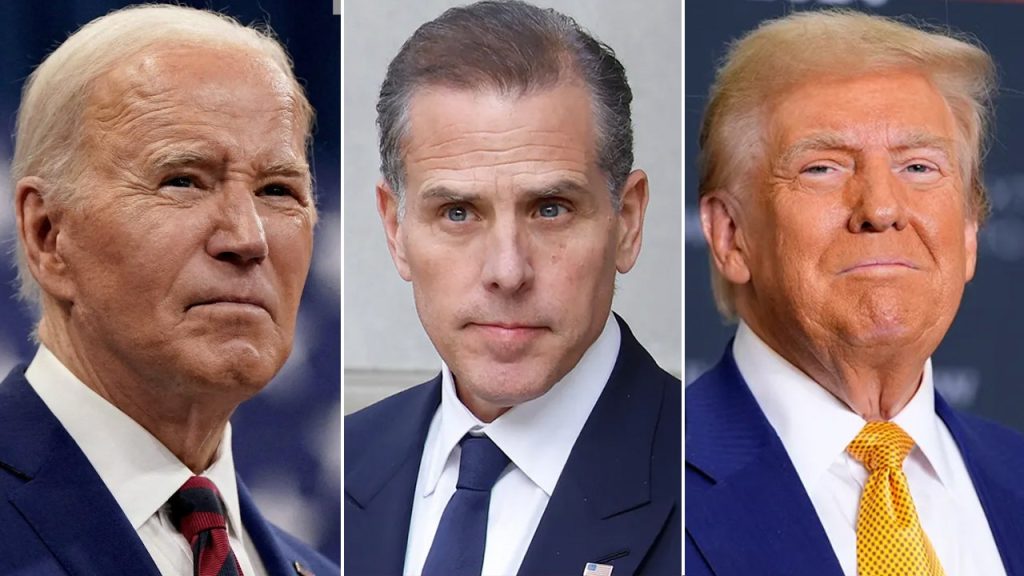The escalating pardon debate, encompassing individual, group, partisan, and even preemptive pardons, has spiraled into a chaotic spectacle. Donald Trump, in a “Meet the Press” interview, derided Joe Biden’s prior assurances about not pardoning his son, Hunter, claiming he always knew Biden would ultimately issue a pardon. Beyond the Hunter Biden situation, the interview itself became a point of contention, with Trump criticizing Kristen Welker, the interviewer, and the press in general, accusing them of bias and unfair treatment towards him, contrasting it with what he perceived as “soft” interviews given to Biden by other journalists. Welker’s persistent questioning, however, yielded significant news, including Trump’s reaffirmation of his campaign promise to deport 11 million undocumented immigrants, followed by a seemingly contradictory statement about working with Democrats on the Dreamer issue. This back-and-forth underscored the complex and often conflicting pronouncements surrounding immigration policy.
Trump’s performance in the interview mirrored his campaign persona, displaying sharpness and seriousness, a departure from his more theatrical rally appearances. He notably backtracked on his campaign pledge to appoint a special prosecutor to investigate Biden, seemingly signaling a move away from a purely retributive approach. However, this attempt at projecting an image of magnanimity was undermined by his suggestion that members of the House January 6th Committee, including Liz Cheney, should be jailed for their actions. While he qualified this by saying such a decision would rest with his attorney general and FBI chief, the statement allowed the media to portray him as advocating for the imprisonment of his political opponents, further fueling the narrative of a polarized and vindictive political climate.
The current pardon controversy, however, extends beyond the individual case of Hunter Biden. President Biden’s sweeping pardon of his son, a convicted criminal, defied his previous promises and ignited a broader debate about the scope and purpose of presidential pardons. This debate has been further intensified by reports that the Biden White House is considering preemptive pardons for individuals perceived as potential targets of Trump-era investigations. Such preemptive pardons, while potentially shielding individuals from politically motivated prosecutions, carry the inherent risk of implying guilt by association. This creates a dilemma for potential recipients, exemplified by Senator-elect Adam Schiff’s refusal to accept a preemptive pardon, highlighting the precarious balance between protection and the presumption of innocence.
The prospect of widespread preemptive pardons raises profound legal and ethical questions. The very act of accepting a pardon, even a preemptive one, can be construed as an admission of potential wrongdoing. This creates a perverse incentive structure where individuals might feel pressured to accept a pardon even if they believe themselves innocent, simply to avoid the risk of future prosecution. Furthermore, the lack of transparency surrounding these potential pardons – with many individuals reportedly unaware they are even under consideration – exacerbates concerns about due process and fairness. This opacity fuels suspicions of political maneuvering and raises questions about the criteria being used to select recipients of these preemptive acts of clemency.
The confluence of these pardon controversies, coupled with both Biden and Trump alleging unfair and selective prosecutions by the Department of Justice, sets a dangerous precedent for the future. It creates a cycle of potential retribution where each successive administration uses the power of the pardon to protect allies and target opponents, further eroding public trust in the impartiality of the justice system. This politicization of the pardon power transforms it from a tool of mercy and reconciliation into a weapon in the ongoing partisan battles. The historical context of the pardon power, as envisioned by the Founding Fathers, stands in stark contrast to its current use. Alexander Hamilton, in Federalist 74, argued for the necessity of a single executive possessing the pardon power to address situations like insurrections or rebellions, where timely offers of clemency could restore tranquility. However, this vision was tempered by concerns, articulated by George Mason, about the potential for abuse, particularly the possibility of a president pardoning crimes committed at their behest.
The current pardon debate demonstrates the prescience of these early concerns. The expansive use of pardons, both preemptive and reactive, for political allies raises questions about the integrity of the justice system and the potential for abuse of power. The lack of effective checks on this power, other than impeachment, underscores the need for a renewed national conversation about the appropriate scope and limits of presidential pardons. The current trajectory, where pardons are increasingly used as political tools, risks undermining the rule of law and further eroding public trust in government. The ideal of the pardon as a mechanism for mercy and reconciliation is being overshadowed by its increasing use as a shield against accountability and a weapon in partisan warfare.

